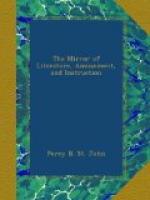They lighted a taper at the dead of night,
And chanted their holiest
hymn;
But her brow and her bosom were damp with
affright
Her eye was all sleepless
and dim!
And the lady of Elderslie wept for her
lord,
When a death-watch beat in
her lonely room,
When her curtain had shook of its own
accord;
And the raven had flapp’d
at her window-board,
To tell of her warrior’s doom!
Now sing you the death-song,
and loudly pray
For the soul of my knight
so dear;
And call me a widow this wretched day,
Since the warning of God is
here!
For night-mare rides on my strangled sleep:
The lord of my bosom is doomed
to die:
His valorous heart they have wounded deep;
And the blood-red tears shall his country
weep,
For Wallace of Elderslie!
Yet knew not his country that ominous
hour,
Ere the loud matin bell was
rung,
That a trumpet of death on an English
tower
Had the dirge of her champion
sung!
When his dungeon light look’d dim
and red
On the high-born blood of
a martyr slain,
No anthem was sung at his holy death-bed;
No weeping was there when his bosom bled—
And his heart was rent in
twain!
Oh, it was not thus when his oaken spear
Was true to that knight forlorn;
And the hosts of a thousand were scatter’d
like deer,
At the blast of the hunter’s
horn;
When he strode on the wreck of each well-fought
field
With the yellow-hair’d
chiefs of his native land;
For his lance was not shiver’d on
helmet or shield—
And the sword that seem’d fit for
Archangel to wield,
Was light in his terrible
hand!
Yet bleeding and bound, though her Wallace
wight
For his long-lov’d country
die,
The bugle ne’er sung to a braver
knight
Than Wallace of Elderslie!
But the day of his glory shall never depart,
His head unentomb’d
shall with glory be balm’d,
From its blood-streaming altar his spirit
shall start;
Though the raven has fed on his mouldering
heart,
A nobler was never embalm’d!
From Argyleshire, where his residence was not a protracted one, Campbell removed to Edinburgh. There he soon became introduced to some of the first men of the age, whose friendship and kindness could not fail to stimulate a mind like that of Campbell. He became intimate with the late Dugald Stewart; and almost every other leading professor of the University of Edinburgh was his friend. While in Edinburgh, he brought out his celebrated “Pleasures of Hope,” at the age of twenty-one. It is perhaps not too much to say of this work, that no poet of this country ever produced, at so early an age, a more elaborate and finished performance. For this work, which for twenty years produced the publishers between two and three hundred pounds a year, the author received at first but L10, which was afterwards increased




